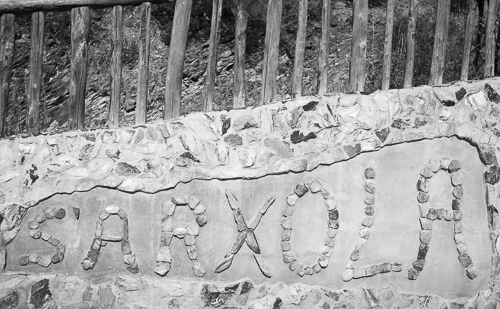Having passed through the town of Teulada and going eastwards, we turn left at a crossroads a couple of kilometres outside the town and follow a gravel road for about a kilometre in a lovely and apparently fertile landscape. Then, we arrive at S’Arxola, an educational farm and guesthouse where we meet Fulvio outside the small house he has built for his family on the top of a small hill.
Just a short distance from their house, another house in neutral colours is located between an olive grove and climbing Mediterranean scrub. Inside the house, there are small, but airy apartments for lucky guests who choose to spend their vacations in this tranquil place located a short distance from the sea and surrounded by Mediterranean fragrances and colours.
The property is located in a hilly terrain surrounded by forests, olive groves and small bushes, while it also has grassy fields on which numerous ducks and hens are free to roam.
By common agreement, Fulvio and his wife Emma decided to change their life and stay in contact with nature. It started when his wife from Bologna was doing her PhD on forest sciences in Florence, while he, who is born and raised in Sardinia, was studying architecture in the same city, gradually started thinking about living in the countryside. They dreamed about creating an organic farm with a guesthouse and make a living with minimum impact on nature based on harvesting edibles from the surrounding vegetation. Reflecting on it and doing thorough searches, about 10 years ago they came to this place, which was in keeping with their wishes, and they decided to buy it. It is called S’Arxola ’e Sirboni, meaning “place frequented by wild boar” in Sardinian. Indeed, as Fulvio says: “the hill on which the farm is located and the surrounding hills were covered with dense oak forests (cork oak and holm oak whose berries are eaten by wild boar), which were destroyed during the last century and are being restored by himself and his wife.
The farm is equipped with solar cells in order to be self-sufficient with electrical energy. Since the solar cells produce more energy than is required on sunny days, the excess energy is stored in batteries. This farm is off grid such that Fulvio, his wife, their two daughters and their guests have to adapt their consumption of electrical energy in accordance with daily and seasonal changes of the sun.
A major activity of Fulvio and his wife is to restore the native vegetation whether it has been degraded or even totally removed. The aim is to both harvest fruits and berries, but also to extract essential oils, all of which has to be done according to the biological and seasonal characteristics of each plant. A description of using essential oils for aromatherapy can be found here.
In order to reduce the residents’ impact on the local environment and live in harmony with nature as far as possible, a field of common reeds is used as an artificial wetland to clean greywater. A list of other plants that can be used for the same purpose is given here.
Fulvio explains that the area, which is now covered by reeds, was first excavated in order to create a pit to receive greywater. Then, it was made impermeable by covering the pit with a layer of clay before filling it with fine gravel which works as a foundation on which has been planted a dense field of common reeds. The reeds perform several beneficial functions, but the most important one is to create oxygen-rich micro-zones along its roots where aerobic bacteria are able to decompose organic matter. This seemingly simple process is actually quite complex and those who want to know more can look here and here. The purified water can be used for irrigation or released to natural watercourses.
During our walk around the farm, Fulvio shows us various myrtle shrubs, but he plans to plant many more of them in order to produce myrtle liqueur. He also shows us numerous mastic bushes and trees. He’s following the growth of these plants closely because he wants to extract vegetable oil from the berries.
This humble brush, present along the coast of all the Mediterranean, was spread by man at least since the era of the Romans because it was used as a medicine, to flavour various kinds of food, as chewing gum, etc. In the past, vegetable oil extracted from mastic berries was known as poor people’s oil because they didn’t possess olive groves. Nowadays, mastic resin is still used as a flavouring, while essential oils are used for cosmetics and medicines.
Having been shown around the farm, Fulvio invites us inside his family’s kitchen, offering us home-made coffee, which we willingly accept. While we are enjoying the coffee, he tells us that he is also keeping bees, extracting honey in autumn, but leaving some amount such that the bees can survive the winter. He’s also telling how the farm is being run in a sustainable way, but there is always room for improvements. He’s working full time at the farm, while his wife is managing forests. Time passes quickly, it’s hot outside, songbirds are singing, else everything is quiet and it’s difficult to leave.

